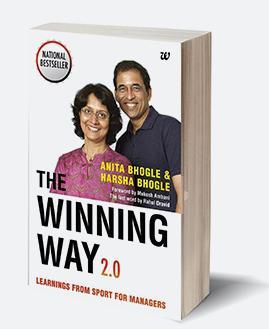
Be it politics, sports or business — indeed, in virtually every sphere of human endeavour — we’re all in it to win it. And if there is a formula for “the winning way”, we’d love to be in on it.
Eminent sports media personality Harsha Bhogle and his wife Anita, a ‘quant’ researcher who founded the consultancy firm Prosearch, have married their learnings from sports and business to fashion a successful corporate speaking programme called The Winning Way. In 2011, they distilled the essence of that programme into a best-seller of the same name; and in this 2.0 edition of the book, they provide two additional chapters, and many more analyses, to give it a contemporary edge.
Harsha is, of course, an enchanting raconteur, and given the access that the Bhogles had to titans in both sports and business, the book commends itself. They have Mukesh Ambani opening the batting for them (with a Foreword), and Rahul Dravid bringing up the tail (with the Last Word). And even the book’s ‘middle order’ has rich lessons from sports that corporate organisations can profit from.
Thus, when the Bhogles flag the hallmarks of a winning team, the best practices that make for a winning cycle, the circumstances in which the winning cycle break, the characteristics that hold winners together, the defining qualities of good leadership and so on, they invoke a wealth of real-world case studies that embellish their argument.
Some of these make for candid, and counter-intuitive, analysis. For instance, the authors posit that an important part of the winning cycle is for teams to not only nurture talent, but to wield the hatchet – even against superstars, when they are over the hill. With searing honesty, they point out that the BCCI’s decisions to let Kapil Dev hang around in the team longer than he merited it, and to allow Sachin Tendulkar to choose the timing of his retirement, were flawed. It is in these passages that the book excels.
Yet, for all its merits, the book occasionally comes across as a little too slick for its selective invocation of timelines, anecdotes, and ex-post-facto substantiation of its management principles based on sporting episodes. Indicatively, while discussing the “winning mindset”, the authors argue that Bangladesh played it too safe in 2006 against Australia when the upstarts should have dared to dream of winning when they had the upper hand. In the next chapter, they commend the setting of “performance” goals for Bangladesh (that is, bat out 50 overs against Australia) as opposed to “result goals” (that is, to win), which would have been “unrealistic”, given their station in life.
There are quite a few other such internal inconsistencies in the management principles that the Bhogles invoke: what applies in one context doesn’t in others, but by the simple expedient of shifting the goalposts, the authors appear to have it both ways.
Perhaps it’s unfair to subject a breezy account of unexceptionable management mantras that lie at the intersection of sports and business to the rigours of scientific validation. Yet, it’s hard to be forgiving of someone like Harsha, who sets the performance bar high, on occasions where the book descends to slickly marketed management mumbo-jumbo.
Source:-hindu businessline
